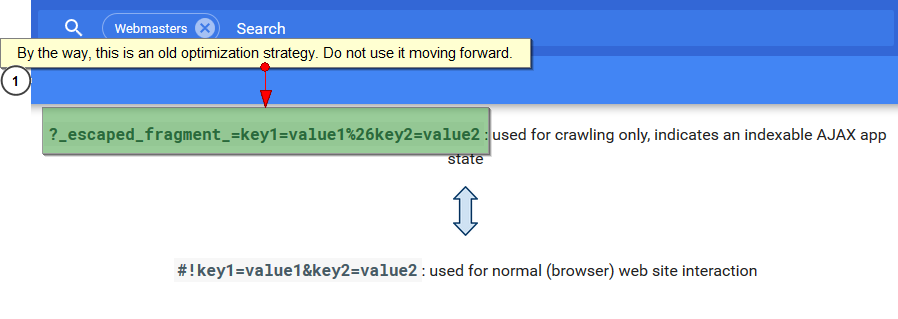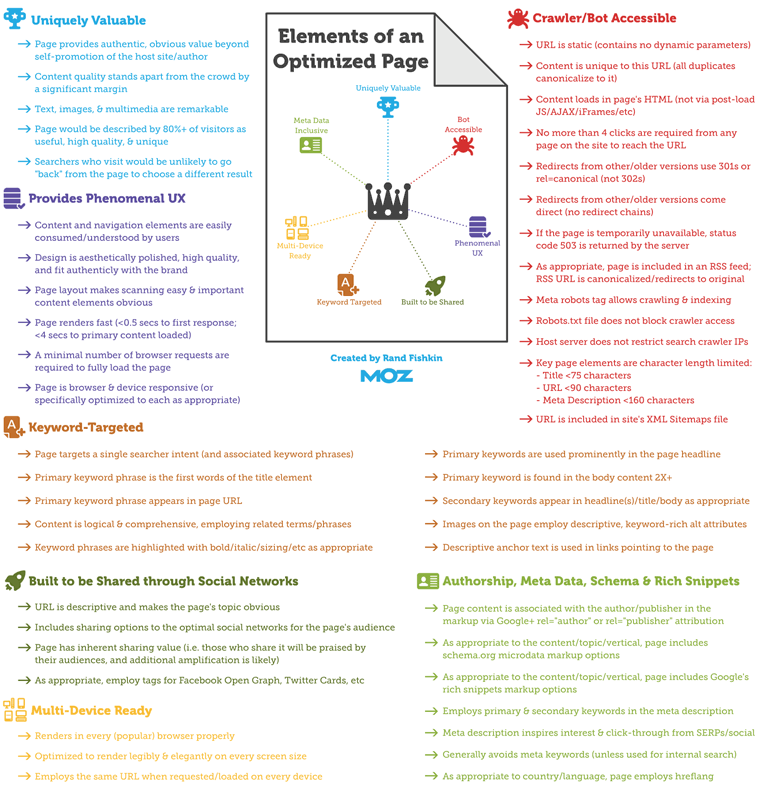SEO is complicated. Hiring someone to help shouldn’t be.
In this article, I’m listing out the top questions and qualities you should look for when hiring an SEO consultant for your business.
What You’ll Learn:
- 12 things to look for in an SEO consultant:
- 100% focus on KPIs
- Recommends projects that help hit goals quickly
- Uses experience to their advantage
- Isn’t scared of red on a report
- Never recommends things that aren’t effective
- Strong understanding of development projects
- Can answer technical questions
- Is honest when they’re unsure
- Never gives up on projects that matter
- Isn’t afraid to get their hands dirty
- Knows when to ease up
- Knows when to call the big meeting
- 50 questions to ask before you hire an SEO consultant
1. 100% Focus on Using SEO to Hit KPIs
A good SEO consultant will be 100% focused on meeting your set metrics for success and key performance indicators (KPIs).
All of their initiatives and efforts should be geared toward this goal. A good consultant will select specific SEO items for your individual business, and plan out initiatives that adhere specifically to those items.
For example, we have more than a handful of clients that have over 20 locations. For each of these clients, one of the main initiatives was to increase traffic to their local listings. I know that I can do a dynamic keyword assignment for all of these pages, write new copy, optimize some images, link it all together and increase their citations.
By putting this plan into action and staying dedicated, we can grow that traffic.
2. Recommend Projects that Help Hit Goals the Quickest
Using this same local listing client set as an example, imagine that instead of doing this keyword assignment for all the pages and focusing on these items that increase rankings, I decided to tell the client to start a blog and make an image sitemap.
Now, those are both excellent recommendations, but the second doesn’t hit the goals that matter for the client and take a longer time to see results. At the end of the day, every SEO consultant needs to focus on the strategies that will move the needle toward the specific goals the client wants to hit.
Generally, I recommend:
- Optimize the existing website
- Keyword analysis
- Keyword assignment
- Optimize code
- Optimize content
- Optimize images
- Optimize internal linking and site structure
- Build out new sections
Every website is different and is at a different stage in the life-cycle and a good SEO consultant will know what to recommend and when.
3. A Good SEO Consultant Uses Experience to Their Advantage
A good SEO consultant has tried a lot of different things in the past and knows what works and what does not.
For example, I have done plenty of hashbang escape fragment optimizations for ajax websites. The first time I did this optimization was for a large news site back in 2010. We did it correctly, got it implemented and then sat and waited.
While we did see improved rankings, it never ranked as well as a normal HTML site. Over the years there have been many times when clients would insist upon this type of optimization, but it has never ranked well in my experience. Instead, I told my clients not to go this route and gave alternate recommendations for ajax websites that have much better ranking potential, save development hours, and are most cost-effective for companies.
Turns out, Google was on the same page, and it officially deprecated the recommendation in 2015.
 4. Undaunted by Red on a Report
4. Undaunted by Red on a Report
If you have a bad report, there is a reason why.
Generally, a new SEO consultant will dance around the bad information even though it is much better to tackle it directly. There is always a reason why the numbers are down.
A good SEO consultant will know why performance is low and have recommendations to fix it.
For example, we were recently looking at a report and home page traffic was down. We decided to look into the dip from every angle and discovered an error in reporting the previous year. The report showed a massive spike in traffic that didn’t exist. We informed the client and a tough conversation turned into a good meeting with better information.
5. Never Recommend Things that Don’t Matter
There are so many SEO best practices that simply don’t matter much. Absolute URLs, alt tags and other minor tweaks won’t make or break your SEO strategy. These small pieces only further the ranking potential of the two main ranking factors: keyword-focused content and hyperlinks.
Linking and keyword strategy need to be looked at first and all smaller tweaks should be secondary. If an SEO consultant is telling you to put alt tags on your site as a top priority, that is a red flag that they don’t see the big picture. Here we see a good breakdown of on-page optimization from Moz:
6. A Strong Understanding of Development Projects
Some projects are harder than others.
For example, if you create a template for static pages, that will be different than a template that applies to hundreds or thousands of category pages.
The optimization strategies need to be completely different for both. It is extremely important that you get the right solutions from your SEO consultant services, otherwise, it will cost time and money.
An SEO consultant needs to have solid development knowledge, good judgment and be able to push a project in the right direction.
7. A Good SEO Consultant Should Be Able to Answer Technical Questions
In the interview process, it’s important to ask technical questions. The consultant should be able to answer most of them, but if they get stumped, that can be a good thing.
It allows you to see how they respond when they don’t know something. Generally, I look for the response, “I don’t know the answer to that for sure. Let me do some research and get back to you.”
Stay tuned for more questions I ask in the interview process.
8. Be Honest When You Don’t Know
Following up on a previous point: no one knows everything.
If your consultant doesn’t know the answer to a technical question, they can either be honest and offer to do some research and look into it, or they can scramble and make something up on the spot.
When you’re first getting started, admit when you needed to do additional research. Clients really appreciate the extra effort, plus any direct information from Google documentation that you’ll be able to share.
9. A Good SEO Consultant Never Gives Up on Projects That Matter
If something is really important to the success of a client’s SEO, a good consultant will make it happen.
If you subscribe to my newsletter you will know I pushed people hard to migrate their website to https for well over a year. Sure, it probably bugged people and many may not have seen it as a big deal.
But it’s an official Google ranking factor, and Chrome cracked down hard on non-HTTPS sites by officially labeling them “Not Secure” in 2018.
So yeah, it was (and is) a big deal.
The moral of the story? If something matters, you have to stay on it and let the client know how important it is. Sure, they will probably be hesitant at first. But eventually, if it is really that important, they will understand and help you execute eventually.
10. Unafraid to Get Their Hands Dirty
Sometimes as a consultant, you need to jump in and add content, optimize a page, change an image, or do whatever else needs to be done.
What you do today in SEO will not impact the website for weeks to months down the road, so if a project falls behind, a good SEO consultant will jump in and take hold of the website, whether it’s linking, blogging or posting on social media to ensure the client gets the best possible results.
11. Knows When to Ease Up
Sometimes a client really does not want to do a certain project or just isn’t ready for a particular SEO undertaking.
A good consultant will know not only when to push, but also when to back off and wait until everyone involved is ready to take on a particular project.
12. A Good SEO Consultant Knows When to Call the Big Meeting
Finally, a good consultant will know when to call the big meeting.
If something needs to be said, a great SEO consultant will call all the major players, from the CEO to the marketing manager, get them all in a room and do a presentation.
Whether it be a good (or bad) report or a new quarterly plan, it is always a good idea to sit down with the client and go through the initiatives.
50 Questions to Ask Before Hiring an SEO Consultant
Here’s a list of 50 questions I ask in the interview process. Feel free to use these next time you interview an SEO consultant.
- What are your favorite SEO tools?
- How do you check rankings for SEO?
- Are you Google Analytics certified?
- What are some of your most successful SEO projects?
- How does blogging play a role in SEO?
- What are the most common page speed issues?
- What is https and why is it important for SEO?
- How would you handle a hacked website?
- How does social media play a role in SEO?
- What are the five types of website models?
- Have you ever optimized in a different language?
- What are some of the manual penalties you can get in Google?
- Tell me about a penalty you have cleaned up?
- Are meta-tags case-sensitive?
- What are some of the algorithmic issues you can have in Google?
- How do you optimize a web page URL? Title? Description? H1/H2? Images? Schema? Internal linking?
- How would you test to see how Google can see content on a page?
- What is the Unicode UTF-8 and why does that matter to Google?
- How do you write a reinclusion request?
- What is different about getting a Google Local page ranked compared to an HTML page?
- What are robots.txt, X-robots tag, a canonical tags and a no-index, no-follow tags and when do you use each?
- How would you handle 1,000 new links pointing at your website with commercial anchor text?
- What are directory structures and subdomains and how are they important for SEO?
- How do you find broken external links pointing at your website?
- What would you do to get a page indexed quickly?
- What is the nositelinksearchbox meta tag?
- What is the notranslate tag?
- What is the refresh meta tag and why is it not recommended?
- What is a .htaccess file and how do you use it?
- How can you use user agent and IP location detection to improve UX?
- What is a hreflang tag?
- What is the difference between an absolute URL and a relative URL?
- What are all the different ways you can optimize for mobile and what are the technical requirements for different domains, subdomains, http headers and responsive pages?
- What are 404 errors?
- What is 200 ok?
- What is a 301 and 302 redirect? When should you use each?
- What is a server header checker?
- What would you do to optimize a website purely in Ajax or Javascript
- Have you ever optimized an application? How would you go about it?
- What would you do if you saw a spike in 404 errors in the Google search console?
- How do you configure a disavow file?
- How do you send out a link takedown request?
- How do you optimize for Google video search? What do you specify in a video markup?
- What do you show in a video sitemap?
- What is a Google product feed and what are the product feed’s attributes?
- How do you optimize for Google news?
- Does Google require a Google news sitemap?
- What are the Google news standout tags and keywords tags? How are they different than other meta tags?
- What are mobile usability errors and how do you fix them?
- What is the difference between SEMRush, SpyFu, Majestic and Moz?
Wrapping Up How to Hire an SEO Consultant
Hiring an SEO consultant is tough.
In the end, you want someone who is experienced, makes good judgement calls, understands the SEO landscape, and is willing to do the work.
Hiring software can also be of help with the right knowledge and patience.
Hopefully, this list will help you hire the very best in the biz.
What is important to you when looking for SEO consultant services? Comment below.



